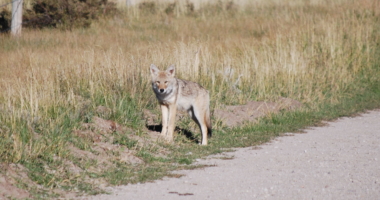Predators Headline During Montana Legislature

We are sprinting to the finish line of the 2019 Legislative session. HB 2, the state budget bill, has made its way through the Senate, and votes are being traded in last minute deals. As mentioned in our other articles, predators were the focus of numerous pieces of legislation. Montana Audubon testified on 11 bills that were motivated by or would have direct implications on predator populations. Though the overarching conversation was hostile to predators broadly, details focused primarily on that most divisive of animals, the gray wolf.
Montana has some of the most liberal wolf harvest laws in the country. The hunting season is six months long and individuals are allowed to buy up to five wolf tags. However, hunting is not the only management tool. In 2013, the legislature passed a law allowing ranchers to harvest wolves killing livestock and a license is not required to do so. Ranchers may also contract with U.S. Fish & Wildlife Services to have problem wolves removed from the area. These management avenues are available so that ranchers are able to protect their way of life. With the added ability to claim financial compensation for “livestock loss” caused by wolves, these management tools help build tolerance on the landscape for large predator conservation. However, since most of these management tools involve lethal control of wolves, increased liberalization of wolf harvest opportunities raise ongoing ethical questions.
Wolves have had a relationship long characterized by conflict in North America, and nearly extirpated from the west in the 1900s due to increased human settlement and habitat loss. In 1978, gray wolves were listed as endangered, and by the early 80s recovery efforts were underway. Just over 30 years, later gray wolves were officially delisted and Montana worked to find ways to support conservation and management efforts while balancing the perspectives and interests of the public. As a result we have a healthy wolf population and a corresponding management strategy which includes a six month hunting season (five over-the-counter tags) and multiple ways for livestock owners to deal with problem animals.
This session, however, there were three bills which would have jeopardized the conservation and management of wolves in the Montana. The first bill, HB 551, introduced by Representative Bob Brown (R-Thompson Falls) aimed to limit the authority the Fish, Wildlife, and Parks’ (FWP) Commission had in setting the hours wolves could be hunted; allowing for night hunting. As inferred, night hunting of any species has potential severe consequences: increased poaching, human safety risks, and would be precedent-setting. The second bill, HB 552, also introduced by Representative Bob Brown, aimed to make trapping set-backs illegal on closed roads — a set-back is the legal amount of distance that a trap must be set back from an area like a road or a trail. The future of trapping will be determined on reducing user conflict, and this bill would have eroded all previous work by the FWP Commission and of the Trappers Advisory Committee. It would also have promoted conflict between user groups. The last bill, HB 279, like the other two bills, was introduced by Representative Bob Brown and would have allowed for the reimbursement of costs incurred for trappers when trapping wolves. This bill would have directly conflicted with the North American Model of Wildlife Conservation — a system which prohibits the commercialization of wildlife. Reimbursing trappers for their costs amounts to a bounty and incentivizes people who would not normally trap to do so. Fortunately all three of these bills were defeated by the hard work of the Montana Wildlife Federation and Montana Audubon.
Newly passed legislation will include wolf licenses as a choice when purchasing a big game combo license; they will be cheaper and hunters will be able to donate to a mitigation account. While these items did pass, they will help to build tolerance for wolves on the landscape. Wolves are a difficult species to hunt and cheaper licenses will not have much of an impact on numbers — we are more concerned about the impact of the mitigation account, but time will tell. Montana Audubon will continue to work with the many partners in our state to balance the interests and perspective of this species and the public – with the hard work of our state and nation to bring these animals back from the brink, wolves are here to stay.